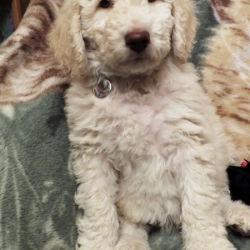


 Starting with a young puppy offers the opportunity to make a lasting impression that shapes their personality and how they cope with stress. Proper socialization through early and positive experiences can result in a happy, adaptable dog that is comfortable in various environments. Without socialization, dogs may become fearful and reactive.
Starting with a young puppy offers the opportunity to make a lasting impression that shapes their personality and how they cope with stress. Proper socialization through early and positive experiences can result in a happy, adaptable dog that is comfortable in various environments. Without socialization, dogs may become fearful and reactive.
Ensure your puppy has positive exposure to people, places, surfaces, sounds, and temperatures to give them the best possible start.
List of experiences a puppy should have:

Puppies want attention. They will do a lot to get that attention sometimes — even if it is negative!
If you scold your puppy for doing things you don’t want them to do, and you ignore it when they are being good, you may end up unintentionally reinforcing their bad behavior which can eventually turn into ongoing bad habits, essentially, you are training them to be bad.
Reinforcing good behavior is a key component of training puppies, as it encourages them to repeat actions that are desirable and helps to establish good habits early on. Here are some ways to reinforce good behavior in puppies:
Use positive reinforcement:Positive reinforcement is the most effective way to reinforce good behavior in puppies. This involves rewarding your puppy with praise, treats, or playtime when they perform a desired behavior, such as sitting or coming when called.
Be consistent: Consistency is essential when reinforcing good behavior.Always reward your puppy immediately after they perform the desired behavior, and use th same reward every time to avoid confusion.
Use a marker word:A marker word such as “yes” or “good” can be used to signal to your puppy that they’ve done something right and that a reward is coming.
Keep training sessions short:Puppies have short attention spans, so keep training sessions short and focused to avoid overwhelming them. Five to ten minutes per session is usually sufficient.
Avoid punishment:Punishment is not an effective way to reinforce good behavior in puppies, and it can actually cause them to become fearful or anxious. Instead, focus on rewarding good behavior and redirecting undesirable behavior.
Make it fun:Training should be a fun and rewarding experience for both you and your puppy. Use toys, treats, and positive reinforcement to make training enjoyable for your puppy.
Reinforcing good behavior is an ongoing process, and it’s important to be patient and consistent. With time and effort, your puppy will learn to behave in a desirable manner and develop good habits that will last a lifetime.
It is not uncommon for puppies to show fear or anxiety while being socialized, especially if they have not been exposed to certain experiences before. However, it’s important to handle the situation carefully to avoid worsening their fear or causing them unnecessary stress. Here are some tips to help your puppy overcome fear during socialization:
Remember, socialization is a gradual process,and may take some time for your puppy to become comfortable with new experiences. Be patient and consistent,and your puppy will eventually learn to enjoy socializationand become a well-adjusted adult dog.
You might also be interested in The Rule of 12 post and the PUPPY SOCIALIZATION CHECKLIST 100 EXPERIENCES IN 100 DAYS .
We have a Private Group on Facebook that's just for our Dreamydoodle Puppy Families
!
Plz Click Below to Join Us.. Please don't forget to answer the questions on the join request screen so our Admins know to accept your request!


Dreamydoodles.com, participates in various affiliate marketing programs. We may earn commissions on purchases made through links to carefully selected products we recommend. The commissions come at no extra cost to you and contribute to maintaining the quality of our website. Please be assured that our recommendations are based on thorough research, and your trust is of utmost importance to us. Thank you for supporting our commitment to providing valuable insights and information."